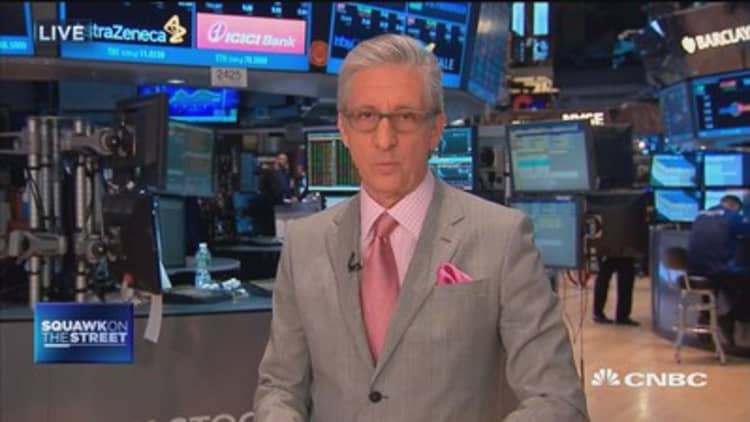
What happened to the recovery in oil stocks?
The pricing and volume action are telling me that investors are doubting the hoped-for 2016 recovery in production volumes.
Yesterday, Chevron hit a three-year intraday low.
The main Energy ETF, a basket of the energy stocks in the , has staged three separate attempts to rally since hitting lows in December and January and is again fading, essentially moving straight down for the past six weeks. Volumes have also faded.
And the rally in crude has stalled. Since bottoming in the low $40s in early March, West Texas Intermediate, the main U.S. benchmark, has staged an impressive rally (over 40 percent) to trade between $58 and $61, but has been stuck in that range for the past six weeks as well.
Read MoreThese stocks are signaling a top in oil, says trader
Here's the problem: Everyone bought energy stocks aggressively in early 2015 on the theory that oil production would bounce back in 2016.
It's human nature. The optimists are focusing on a bounce.
Anticipating that, volumes in big energy ETFs like Oil Service and Exploration & Production picked up dramatically in January as the sector appeared to be bottoming out.
But many are starting to realize that, while oil prices may stage a modest comeback, oil production may not, at least any time soon.
What's the problem? The Saudis.
The theory was OPEC and the Saudis were dead. They could no longer dictate prices.
Except, they could. It turns out the ghost of OPEC is still very much alive.
Read MoreCrude nearing key inflection point: Technician
The Saudis have made it clear that they will do anything to maintain their market share, and if that includes pumping more and more oil they will do it, regardless of the price. Their interest is to maintain the levels of social spending they need to keep their country afloat.
What's the upshot for energy investors? The real weak link is oil services, which may be facing a much longer recovery path than expected. There's a crisis of confidence in investing in capital expenditures in energy. For U.S. producers, why invest billions to start a new program, if any day the Saudis could increase production?
After dropping nearly 50 percent from August to March, the Oil Service ETF, a basket of the largest oil service names including Halliburton, have staged only a tepid rally (up 15 percent from the lows), and indeed has been fading for the past six weeks. Volume is also drying up.
What about exploration & production stocks, the shale plays? Production is declining in the U.S., and that should be bullish for the price of oil. The drillers' value is predicated on not just production but the assets they have in the ground. In other words, E&P is much more closely linked to oil prices.
So if oil goes up more, that means go out and buy E&P companies, right? Well, they also have a big problem: They need a lot of money to keep drilling. The depletion rates on the wells are high, so they need access to cheap capital to lend them money to keep drilling.
Read MoreDrill, drill, drill! And then maybe go bankrupt
That's the high yield market, which they have tapped with great enthusiasm in the last few years. But that venue may be a problem: These companies need access to cheap funds, and rates the banks charge for this high yield debt are going up.
Why? Because the cash flow is still poor, even if oil stays at $60 instad of $43. Without higher cash flows, it's hard to convince bankers to lend. They are also aware of the risk the Saudis pose, and they will adjust their rates to account for that risk.
That's one reason the main E&P ETF has also only staged a modest recovery off its January low, up less than 20 percent after also dropping 50 percent from August to January. Volumes, too, have dried up in the last six weeks.
So where will the shale companies get the money to keep drilling? They will issue more stock, which is exactly what Cowen said in a note yesterday: "We expect ... E&Ps to issue additional equity in 2H2015 to fund 2016 capex as borrowing bases will be declining and debt metrics deteriorating."
More stock, of course, will put pressure on stock prices.
Cowen, by the way, also expects crude oil production to decline.
When you think about it, it is remarkable that no one has gone out of business. Partly it's because many were hedged against declining prices, so we have not seen a dramatic decline in cash flows yet. Partly it's because banks have been willing to give them time by renegotiating the credit lines.
But don't be surprised if some don't make it. One hedge fund trader specializing in energy stocks I know has a list of six E&P companies that are likely to go under unless production picks up.


